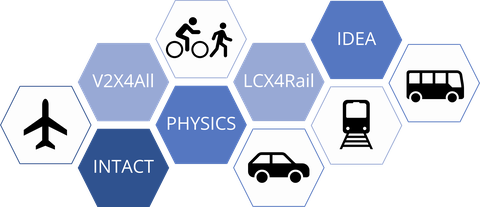May 04, 2023
Start of five new research projects
Since the beginning of the year, five new research projects could be successfully aquired and started with the participation of the Chair of Information Technology for Transportation Systems (ITVS). More details about the projects can be found on the linked pages on our website.
INTACT
INTACT realizes transparent communication between aircraft and ground systems (gate) for a variety of applications and services. Thus, an integrated digitalization for the mentioned areas is enabled.
ITVS addresses the funding goal "Safe and Passenger-Friendly Aviation" in cooperation with the joint partners. To this end, sensory solutions for passenger and airline-oriented passenger handling concepts are being developed in the networked aircraft cabin of the future. Through information processing via high-technology approaches, linked with AI-/ML-based analysis approaches, an improvement of comfort and efficiency is targeted with the collaborative partners and a pandemic-compatible aircraft boarding is developed and validated. The resulting efficient digital value creation is a significant factor for Germany as an aviation location.
PHYSICS
PHYSICS (PHY Security Innovations for Communication Systems) research project addresses the Physical Layer Security (PLS) of 5G/6G through novel and integrated detection, mitigation and compensation strategies. Real-time channel estimation for PLS allows to detect attackers by evaluating various signal parameters and applying Machine Learning (ML) techniques. Beamforming can be used to mitigate the attacks by sniffers. To compensate for an attack by a jammer in the same frequency band, the Technology Handover to Optical Wireless is developed in the project. The advantages of Light Fidelity (Li-Fi) data transmission in terms of security can thus be seamlessly integrated into 5G/6G communication networks by providing an isolated, tap-proof channel. The developed methods for PLS are tested and demonstrated in the area of connected driving and vehicle-to-everything (V2X) communication. PHYSICS is funded by the German Federal Office for Information Security (BSI) until the end of 2024.
V2X4All
The current implementation of digitalized transport systems with networked communication shows that vulnerable road users (VRU) such as pedestrians, cyclists, etc. as well as public transport in particular, are given little consideration in this connected system and there is currently also no approach for a holistic data exchange.
The goal is to realize the wireless networking of different modes of transport and user groups with each other. The usage of vehicle-to-everything (V2X) access technologies in combination with existing radio technologies for an interactive V2X application with uniform data exchange through already existing protocols shall be the project content.
LCX4Rail
The seamless provision of communications services for rail vehicles is a prerequisite for attractive rail passenger services and lays the foundation for automated operating procedures in rail traffic. However, the geographical requirements of track routing (valleys, tunnels) mean that conventional networking solutions require a large number of base stations or repeaters. This is where the LCX4Rail project scope is focused. Leaky coaxial cables (LCX) enable reliable radio coverage along a linear corridor and are therefore particularly suitable for the topological requirements of rail traffic.
As part of the funding line "Change through Innovation in the Region (WIR!)" of the Federal Ministry of Education and Research, technologies in the Smart Rail innovation field are being developed and tested at the Smart Rail Campus in Annaberg-Buchholz. Within this project cluster, innovative applications of leaky coaxial cables (LCX) technology in rail transport are being investigated in the LCX4Rail project.
IDEA
The project Innovative Depot Automation (IDEA) aims to research the automation of vehicle depots in transport companies by means of innovative, radio-based communication between autonomously moving vehicles and a depot management system via a 5G campus network, and to test and validate the solutions developed with real vehicles in a laboratory environment. Project partners are MRK Management Consultants GmbH and the software company PSI Transcom GmbH from Berlin. The IDEA project has a duration of 21 months and is funded with a total of 3 million euros by the German Federal Ministry for Digital and Transport as part of the InnoNT guideline for the promotion of innovative network technologies in mobile communications.

